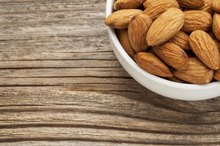Cottage Cheese Side Effects
Many dieters turn to cottage cheese for weight loss, pairing it with fruits such as melons, berries and pineapple. This dairy food is high in calcium and other nutrients, but there are side effects to eating cottage cheese. It can cause various reactions, and its protein and sodium content may trigger health problems.
May Contribute Toward Kidney Problems
Cottage cheese provides an excellent source of protein. A 1-cup serving of full-fat cottage cheese has approximately 25 g of protein, while 2-percent milk fat cottage cheese contains a bit more at about 26.7 g. While your body needs protein for energy, muscle building and immune function, eating cottage cheese in addition to other foods rich in other proteins may provide too much. Eating a high-protein diet over a long period can put stress on your kidneys, which can decrease the efficiency of its waste removal function. The average diet includes 50 to 175 g of protein daily, or 10 to 35 percent of the calories in a 2,000-calorie diet.
- Cottage cheese provides an excellent source of protein.
- A 1-cup serving of full-fat cottage cheese has approximately 25 g of protein, while 2-percent milk fat cottage cheese contains a bit more at about 26.7 g. While your body needs protein for energy, muscle building and immune function, eating cottage cheese in addition to other foods rich in other proteins may provide too much.
Can Trigger Allergic Reactions
Cheese Allergy Symptoms
Learn More
Many people have dairy allergies, which is primarily a sensitivity to a protein in milk known as casein. Cottage cheese is made of coagulated milk with some of the whey pressed out. Side effects of consuming cottage cheese when you have an allergy include skin reactions like hives and itching, facial swelling, breathing trouble and anaphylaxis. If you suffer from a dairy allergy, you can make your own non-dairy cottage cheese. While the flavor suffers, you can approximate the texture of cottage cheese by mashing tofu with a fork.
- Many people have dairy allergies, which is primarily a sensitivity to a protein in milk known as casein.
- While the flavor suffers, you can approximate the texture of cottage cheese by mashing tofu with a fork.
May Cause Gastrointestinal Distress
Eating cottage cheese is not generally recommended if you have lactose intolerance. This condition makes it impossible to digest sugars present in dairy products; it occurs because your small intestine produces only small quantities of an enzyme known as lactase that aids food absorption. Consuming cottage cheese when you suffer from lactose intolerance may trigger diarrhea, bloating, cramps, flatulence and upset stomach. Your physician may prescribe medications that introduce more lactase into your body to make easier to digest dairy products.
- Eating cottage cheese is not generally recommended if you have lactose intolerance.
Could Elevate Blood Pressure
Calories in Paneer Cheese
Learn More
A serving of full-fat cottage cheese has 819 mg of sodium, while reduced fat cottage cheese contains 746 mg of sodium. This much sodium accounts for at least half the daily limit of 1,500 mg as reported by the American Heart Association. Consuming cottage cheese as part of a diet high in sodium can cause hypertension, which can increase your risk of heart attack and stroke.
Related Articles
References
- Cleveland Clinic; Milk Allergies; March 2007
- Cheese, cottage, low-fat, 2% milk fat. U.S. Department of Agriculture. Published April 15, 2019.
- Lordan R, Tsoupras A, Mitra B, Zabetakis I. Dairy Fats and Cardiovascular Disease: Do We Really Need to be Concerned?. Foods. 2018;7(3). doi:10.3390/foods7030029
- Thorning TK, Raben A, Tholstrup T, Soedamah-muthu SS, Givens I, Astrup A. Milk and dairy products: good or bad for human health? An assessment of the totality of scientific evidence. Food Nutr Res. 2016;60:32527. doi:10.3402/fnr.v60.32527
- Rozenberg S, Body JJ, Bruyère O, et al. Effects of Dairy Products Consumption on Health: Benefits and Beliefs--A Commentary from the Belgian Bone Club and the European Society for Clinical and Economic Aspects of Osteoporosis, Osteoarthritis and Musculoskeletal Diseases. Calcif Tissue Int. 2016;98(1):1-17. doi:10.1007/s00223-015-0062-x
- Kliem KE, Givens DI. Dairy products in the food chain: their impact on health. Annu Rev Food Sci Technol. 2011;2:21-36. doi:10.1146/annurev-food-022510-133734
Writer Bio
Nicki Wolf has been writing health and human interest articles since 1986. Her work has been published at various cooking and nutrition websites. Wolf has an extensive background in medical/nutrition writing and online content development in the nonprofit arena. She graduated with a Bachelor of Arts in English from Temple University.









